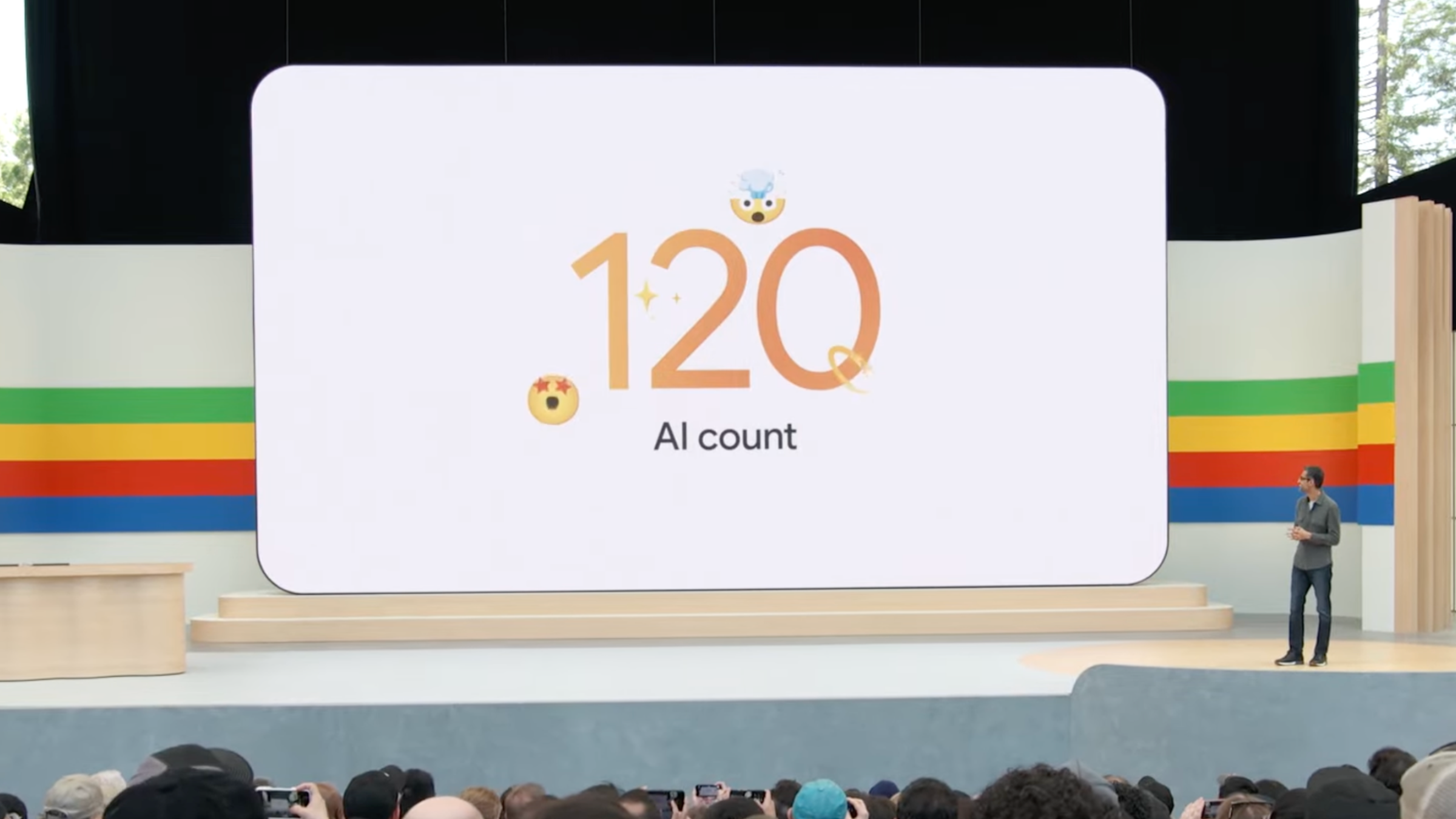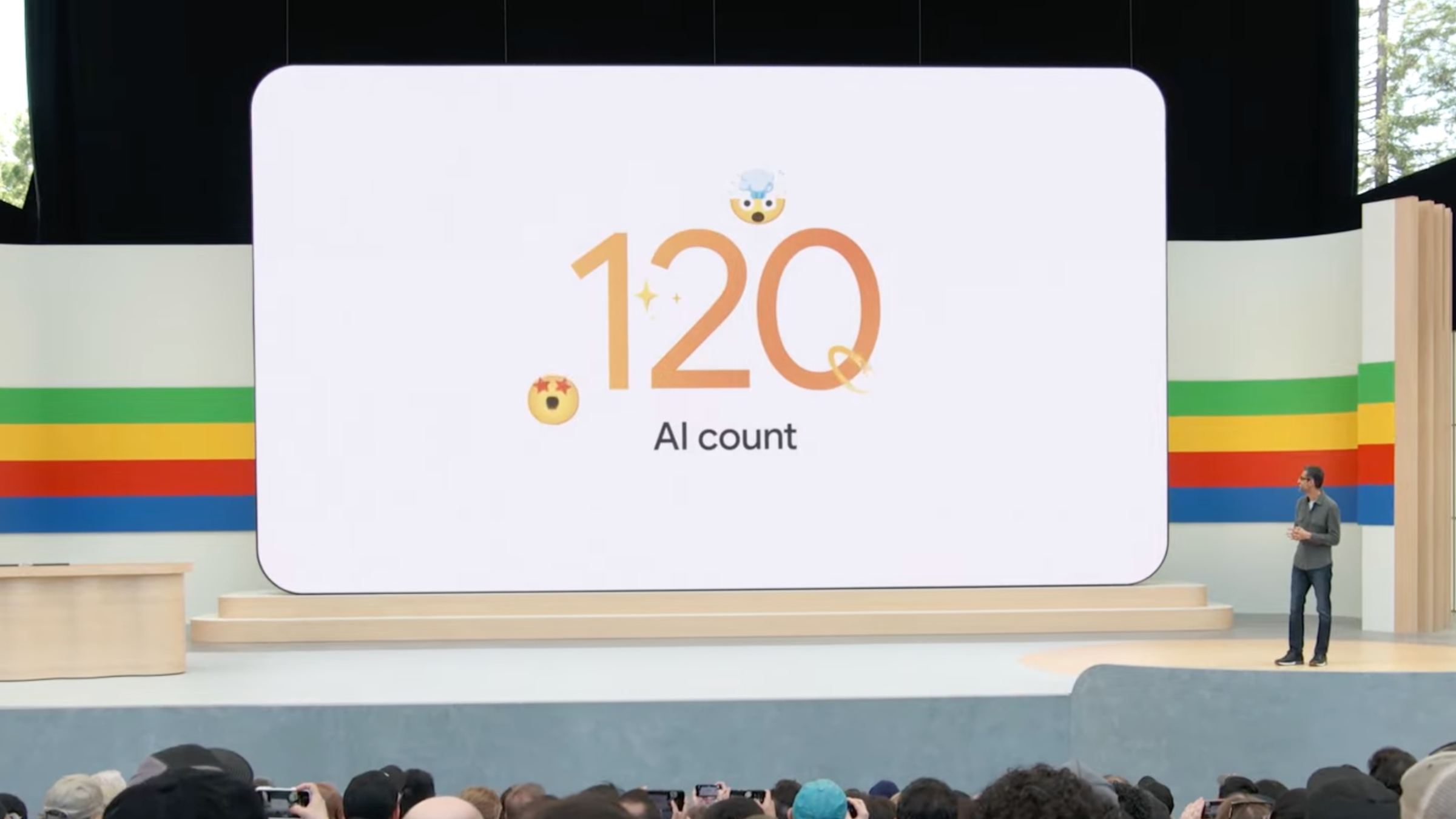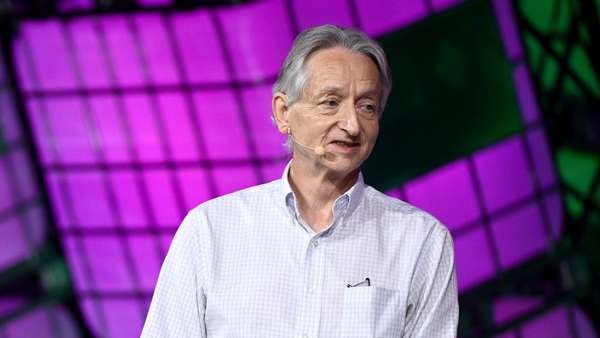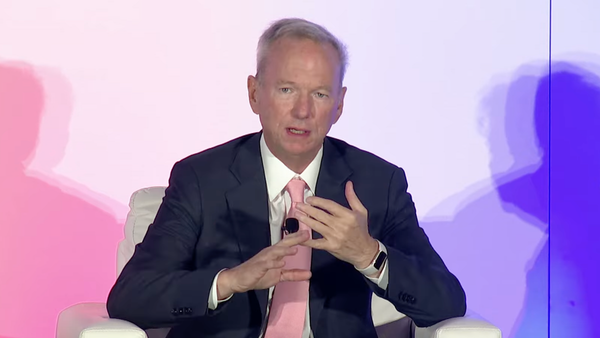
At the end of Google’s snorefest of an I/O presentation on Tuesday, CEO Sundar Pichai took the stage to inform the crowd his team had used the term “AI” 120 times over the preceding two hours. He then said it one more time for good measure, so the counter would tick over to 121 and the audience could clap like a bunch of trained seals. The tired display wasn’t just an illustration of how fully Silicon Valley has embraced the latest hype cycle, but also how exhausting the whole thing has become a year and a half after the release of ChatGPT.
Throughout the keynote, Google executives showed off a ton of pretty standard features that were supposed to seem far more impressive because they had some link to Gemini, the name for its current suite of large language models (LLMs). The lemmings in the audience celebrated such groundbreaking features as getting Google Photos to find your license plate number, having a chatbot process the return for some shoes you ordered online, and getting Gemini to throw together some spreadsheets for you. The revolutionary nature of the AI future just continues to astound.
The company also brought DeepMind’s Demis Hassabis — excuse me, Sir Demis Hassabis — up to do some AI boosting of his own. That including repeating a debunked claim that Google’s AI tools had discovered a ton of “new materials” last year. Researchers who reviewed a subset of Google’s data concluded “we have yet to find any strikingly novel compounds,” with one telling 404 Media, “the Google paper falls way short in terms of it being a useful, practical contribution to the experimental materials scientists.” A little later, they got Donald Glover to lend some credibility to Google’s AI video generation efforts, making the dubious claim that it will let anyone become a director — just like we were told with home video cameras, smartphones, and other technologies that did little to break down Hollywood’s gates.
How Hollywood used the digital transition against workers
Gone are the days when tech executives could reasonably make us believe artificial general intelligence (AGI) was on the horizon because they’d thrown so much capital and compute behind getting their models to do slightly more advanced work than they’d done before. They certainly can’t scare us any longer with the idea that sentient AIs are on the cusp of enslaving us, if not just killing us all. Beyond the massively oversold new features that might not even need an LLM in the first place, the leaders of this AI push are getting lost in their own fantasies.
Take OpenAI CEO Sam Altman. He’s recently been making the podcast rounds sounding as though the past year of AI proselytizing has made him lose his remaining grasp on reality. Earlier this week, he appeared on the Logan Bartlett Show where he claimed AI will create a huge market for “human, in-person, fantastic experiences” — something that definitely doesn’t exist in the metaverses Altman must think we currently live in. A few days earlier, he joined the increasingly radicalized bros at All-In to explain that universal basic income is dead; instead we should strive for a universal basic compute where everyone would get a share in an LLM to use or sell as they see fit. It had big “let them eat compute” energy.
OpenAI had a showcase of its own this week that was similarly underwhelming, despite how much the company’s executives and parts of the media tried to pretend otherwise. As a few members of the OpenAI team showed off a ChatGPT voice bot doing math equations, responding to basic requests, and doing a very short voice translation demo with a flirty, female tone that got commentators obsessively comparing it to the movie Her, the tool itself kept making mistakes and unrelated comments that the presenters had to awkwardly laugh off. Over at Intelligencer, John Herrman astutely observed that AGI is no closer to being achieved, so OpenAI is getting its tools to “perform the part of an intelligent machine.”
Going back to the 1960s, we know humans are suckers for computers that pretend to be thinking machines, even when they’re doing nothing of the sort. Leading the update, OpenAI CTO Mira Murati said its updated chatbot just “feels so magical.” But as we know, magic is an illusion that always has an explanation. OpenAI just doesn’t want us to know what’s happening below the hood of its tools and keep buying the fantasy as long as possible. Murati is the same woman who became a meme back in March for the expression she pulled when asked in a Wall Street Journal interview if YouTube videos had been used to train OpenAI’s Sora video generator.
The reality is that no matter how much OpenAI, Google, and the rest of the heavy hitters in Silicon Valley might want to continue the illusion that generative AI represents a transformative moment in the history of digital technology, the truth is that their fantasy is getting increasingly difficult to maintain. The valuations of AI companies are coming down from their highs and major cloud providers are tamping down the expectations of their clients for what AI tools will actually deliver. That’s in part because the chatbots are still making a ton of mistakes in the answers they give to users, including during Google’s I/O keynote. Companies also still haven’t figured out how they’re going to make money off all this expensive tech, even as the resource demands are escalating so much their climate commitments are getting thrown out the window.
AI is fueling a data center boom. It must be stopped.
This whole AI cycle was fueled by fantasies, and when people stop falling for them the bubble starts to deflate. In The Guardian, John Naughton recently laid out the five stages of financial bubbles, noting AI is between stages three and four: euphoria and profit-taking. Tech companies like Microsoft and Google are still spending big to maintain the illusion, but it’s hard to deny that savvy investors see the writing on the wall and are planning their exits, if they haven’t already begun them to avoid being wiped out. The fifth stage — panic — is where we’re headed next.
That doesn’t mean generative AI will disappear. Think back to the last AI cycle in the mid-2010s when robots and AI were supposed to take all our jobs and make us destitute. The fantasy of self-driving cars is still limping along and some of those tools became entrenched, particularly the algorithmic management techniques used to carve workers out of labor protections and make it harder for them to put up a fight against bosses like Amazon and Uber.
Even though the excitement around generative AI is giving way to exhaustion, that doesn’t mean the companies behind these tools aren’t still trying to expand their power over how we used digital technology. It’s quite clear that Google is trying to further sideline the open web by ingesting it into its model then expecting people to spend even more time on its platforms than anywhere else. Things aren’t so different with OpenAI, where they’re hoping to revive the failed voice assistant push that followed the last moment of AI hype and get people used to depending on ChatGPT for virtually everything they do.
Google wants to take over the web
Between those visions, the Google one feels far more threatening because of the structural transformation it hopes to carry out that will further platformize our online experience, at a moment when people are feeling increasingly frustrated with the state of the internet as the services we’ve come to depend on further erode under pressure to maximize profits. But that doesn’t mean OpenAI’s efforts should be ignored. With the backing of Microsoft, it wants to sell people an illusion of intelligence to get them to take their guards down for a power play of its own.
Each of these companies present a threat in their own way, but there might be some solace in the recognition that the return to AI winter is inevitable — and the crash that’s coming could be unlike one we’ve seen in quite some time. The question is how long companies will keep spending increasingly vast sums to pump a little more hot air into the bubble to delay its total deflation. Seeing a CEO count the number of times his underlings said “AI” during a keynote suggests they’re already running on fumes.










Member discussion